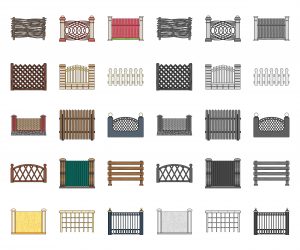
Residential fencing plays an aesthetic role as well as multiple practical roles, such as protecting the privacy and the security of the residents and delimiting the property. The range of materials used on residential properties is very wide – here are some of the most common options offered by fence company Denver contractors.
Vinyl Fencing
One of the materials that entered the market recently, vinyl fencing panels are appreciated by homeowners for their durability, their affordability and for the material’s availability in a seemingly endless range of styles and colors. The synthetic material resists almost any weather – prolonged exposure to moisture does not harm it and even the strongest UV radiation leaves the colors of your vinyl fence unchanged. The material will not split, warp or blister either. In terms of maintenance, vinyl fences need only a little occasional cleaning, nothing else.
Composite Fencing
The material uses engineered wood, plastic and resins to make very durable and attractive fencing. The range of available styles is simply amazing, both in terms of colors and in styles; composite materials are available even in textures and hues that replicate natural wood or stone. In terms of costs and resistance, composite is slightly more expensive than vinyl, while offering superior durability without needing any special maintenance.
Wood Fencing
The most traditional fencing material of them all, wood can be crafted, stained and painted to achieve almost any design. The most common wood varieties used for fencing are pine and cedar, but more expensive varieties, such as redwood and cypress are also used.
Natural materials being sensitive to the effects of the weather, wood fences need to be cleaned, inspected and repaired regularly. The maintenance tasks required should also include the regular application of protective coatings and paint to prevent the damage caused by harsh sunshine, such as splitting as well as the appearance of rot and insect attacks.
Wrought Iron
Another traditional material, wrought iron is the material from which the most elegant and strongest fences are constructed. Wrought iron fencing is ornamental, therefore it cannot be used for protecting your privacy from the eyes of passers-by, but you can count on your fence to make a great first impression on your visitors. The material is among the more expensive solutions and it also needs regular maintenance that should involve cleaning, inspections to rule out or identify rust and the application of protective coating products.
Chain-Link Fencing
The material might look a bit utilitarian, but it is an increasingly common choice not only for commercial, but for residential properties as well. The material offers lots of great benefits, such as affordability, maintenance-free durability and modern chain-link is also diverse in terms of appearance, allowing buyers to choose from a wide range of patterns, gauges and colors.
Galvanized Aluminum
Like iron, aluminum is also used mainly for ornamental fencing. It is more affordable than iron, but at least as versatile and durable. Another benefit of aluminum fencing is the low maintenance that it requires – other than occasional cleaning with a hose and inspection, your aluminum fence will serve you and your property for decades.